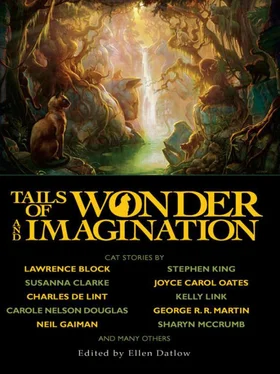Ellen Datlow - Tails of Wonder and Imagination
Здесь есть возможность читать онлайн «Ellen Datlow - Tails of Wonder and Imagination» весь текст электронной книги совершенно бесплатно (целиком полную версию без сокращений). В некоторых случаях можно слушать аудио, скачать через торрент в формате fb2 и присутствует краткое содержание. Год выпуска: 2010, ISBN: 2010, Издательство: Night Shade Books, Жанр: Фэнтези, Фантастика и фэнтези, Ужасы и Мистика, на английском языке. Описание произведения, (предисловие) а так же отзывы посетителей доступны на портале библиотеки ЛибКат.
- Название:Tails of Wonder and Imagination
- Автор:
- Издательство:Night Shade Books
- Жанр:
- Год:2010
- ISBN:978-1-59780-170-6
- Рейтинг книги:5 / 5. Голосов: 1
-
Избранное:Добавить в избранное
- Отзывы:
-
Ваша оценка:
- 100
- 1
- 2
- 3
- 4
- 5
Tails of Wonder and Imagination: краткое содержание, описание и аннотация
Предлагаем к чтению аннотацию, описание, краткое содержание или предисловие (зависит от того, что написал сам автор книги «Tails of Wonder and Imagination»). Если вы не нашли необходимую информацию о книге — напишите в комментариях, мы постараемся отыскать её.
collects the best of the last thirty years of science fiction and fantasy stories about cats from an all-star list of contributors.
Tails of Wonder and Imagination — читать онлайн бесплатно полную книгу (весь текст) целиком
Ниже представлен текст книги, разбитый по страницам. Система сохранения места последней прочитанной страницы, позволяет с удобством читать онлайн бесплатно книгу «Tails of Wonder and Imagination», без необходимости каждый раз заново искать на чём Вы остановились. Поставьте закладку, и сможете в любой момент перейти на страницу, на которой закончили чтение.
Интервал:
Закладка:
Indeed, Mr. Muir was proud of her, and happy for her. And if he felt, now and then, a faint resentment—or, if not quite resentment, a tinge of regret at the way their life had diverged into lives—he was too much a gentleman to show it.
“Where is Miranda? Have you seen Miranda today?”
It was noon, it was four o’clock, it was nearly dusk, and Miranda had not returned. For much of the day Alissa had been preoccupied with telephone calls—the phone seemed always to be ringing—and only gradually had she become aware of the cat’s prolonged absence. She went outside to call her; she sent the servants out to look for her. And Mr. Muir, of course, gave his assistance, wandering about the grounds and for some distance into the woods, his hands cupped to his mouth and his voice high-pitched and tremulous: “ Kitty-kitty-kitty-kitty-kitty! Kitty-kitty-kitty—” How pathetic, how foolish — how futile! Yet it had to he performed since it was what, in innocent circumstances, would be performed. Julius Muir, that most solicitous of husbands, tramping through the underbrush looking for his wife’s Persian cat….
Poor Alissa! he thought. She’ll be heartbroken for days—or would it be weeks?
And he, too, would miss Miranda—as a household presence at the very least. They would have had her, after all, for ten years this autumn.
Dinner that night was subdued, rather leaden. Not simply because Miranda was missing (and Alissa did seem inordinately and genuinely worried), but because Mr. Muir and his wife were dining alone; the table, set for two, seemed almost aesthetically wrong. And how unnatural, the quiet… Mr. Muir tried to make conversation but his voice soon trailed off into a guilty silence. Midmeal Alissa rose to accept a telephone call (from Manhattan, of course—her agent, or her director, or Alban, or a female friend—an urgent call, otherwise Mrs. Muir did not accept calls at this intimate hour) and Mr. Muir—crestfallen, hurt—finished his solitary meal in a kind of trance, tasting nothing. He recalled the night before—the pungent-smelling cat food, the grainy white poison, the way the shrewd animal had looked up at him, and the way she’d brushed against his leg in a belated gesture of… was it affection? Reproach? Mockery? He felt a renewed stab of guilt, and an even more powerful stab of visceral satisfaction. Then, glancing up, he chanced to see something white making its careful way along the top of the garden wall….
Of course it was Miranda come home.
He stared, appalled. He stared, speechless—waiting for the apparition to vanish.
Slowly, in a daze, he rose to his feet. In a voice meant to be jubilant he called out the news to Alissa in the adjoining room: “Miranda’s come home!”
He called out: “Alissa! Darling! Miranda’s come home!”
And there Miranda was, indeed; indeed it was Miranda, peering into the dining room from the terrace, her eyes glowing tawny gold. Mr. Muir was trembling, but his brain worked swiftly to absorb the fact, and to construe a logic to accommodate it. She’d vomited up the poison, no doubt. Ah, no doubt! Or, after a cold, damp winter in the gardener’s shed, the poison had lost its efficacy.
He had yet to bestir himself, to hurry to unlatch the sliding door and let the white cat in, but his voice fairly quavered with excitement: “Alissa! Good news! Miranda’s come home!”
Alissa’s joy was so extreme and his own initial relief so genuine that Mr. Muir—stroking Miranda’s plume of a tail as Alissa hugged the cat ecstatically in her arms—thought he’d acted cruelly, selfishly—certainly he’d acted out of character—and decided that Miranda, having escaped death at her master’s hands, should be granted life. He would not try another time.
Before his marriage at the age of forty-six Julius Muir, like most never-married men and women of a certain temperament—introverted, self-conscious; observers of life rather than participants—had believed that the marital state was unconditionally marital; he’d thought that husband and wife were one flesh in more than merely the metaphorical sense of that term. Yet it happened that his own marriage was a marriage of a decidedly diminished sort. Marital relations had all but ceased, and there seemed little likelihood of their being resumed. He would shortly be fifty-seven years old, after all. (Though sometimes he wondered: Was that truly old?)
During the first two or three years of their marriage (when Alissa’s theatrical career was, as she called it, in eclipse), they had shared a double bed like any married couple—or so Mr. Muir assumed. (For his own marriage had not enlightened him to what “marriage” in a generic sense meant.) With the passage of time, however, Alissa began to complain gently of being unable to sleep because of Mr. Muir’s nocturnal “agitation”—twitching, kicking, thrashing about, exclaiming aloud, sometimes even shouting in terror. Wakened by her he would scarcely know, for a moment or two, where he was; he would then apologize profusely and shamefully, and creep away into another bedroom to sleep, if he could, for the rest of the night. Though unhappy with the situation, Mr. Muir was fully sympathetic with Alissa; he even had reason to believe that the poor woman (whose nerves were unusually sensitive) had suffered many a sleepless night on his account without telling him. It was like her to be so considerate; so loath to hurt another’s feelings.
As a consequence they developed a cozy routine in which Mr. Muir spent a half-hour or so with Alissa when they first retired for the night; then, taking care not to disturb her, he would tiptoe quietly away into another room, where he might sleep undisturbed. (If, indeed, his occasional nightmares allowed him undisturbed sleep. He rather thought the worst ones, however, were the ones that failed to wake him.)
Yet a further consequence had developed in recent years: Alissa had acquired the habit of staying awake late—reading in bed, or watching television, or even, from time to time , chatting on the telephone—so it was most practical for Mr. Muir simply to kiss her good-night without getting in bed beside her, and then to go off to his own bedroom. Sometimes in his sleep he imagined Alissa was calling him back—awakened, he would hurry out into the darkened corridor to stand by her door for a minute or two, eager and hopeful. At such times he dared not raise his voice above a whisper: “Alissa? Alissa, dearest? Did you call me?”
Just as unpredictable and capricious as Mr. Muir’s bad dreams were the nighttime habits of Miranda, who at times would cozily curl up at the foot of Alissa’s bed and sleep peacefully through to dawn, but at other times would insist upon being let outside, no matter that Alissa loved her to sleep on the bed. There was comfort of a kind—childish, Alissa granted—in knowing the white Persian was there through the night, and feeling at her feet the cat’s warm, solid weight atop the satin coverlet.
But of course, as Alissa acknowledged, a cat can’t be forced to do anything against her will. “It seems almost to be a law of nature,” she said solemnly.
A few days after the abortive poisoning Mr. Muir was driving home in the early dusk when, perhaps a mile from his estate, he caught sight of the white cat in the road ahead—motionless in the other lane, as if frozen by the car’s headlights. Unbidden, the thought came to him: This is just to frighten her —and he turned his wheel and headed in her direction. The golden eyes flared up in a blaze of blank surprise—or perhaps it was terror, or recognition— This is just to redress the balance, Mr. Muir thought as he pressed down harder on the accelerator and drove directly at the white Persian—and struck her, just as she started to bolt toward the ditch, with the front left wheel of his car. There was a thud and a cat’s yowling, incredulous scream—and it was done.
Читать дальшеИнтервал:
Закладка:
Похожие книги на «Tails of Wonder and Imagination»
Представляем Вашему вниманию похожие книги на «Tails of Wonder and Imagination» списком для выбора. Мы отобрали схожую по названию и смыслу литературу в надежде предоставить читателям больше вариантов отыскать новые, интересные, ещё непрочитанные произведения.
Обсуждение, отзывы о книге «Tails of Wonder and Imagination» и просто собственные мнения читателей. Оставьте ваши комментарии, напишите, что Вы думаете о произведении, его смысле или главных героях. Укажите что конкретно понравилось, а что нет, и почему Вы так считаете.












